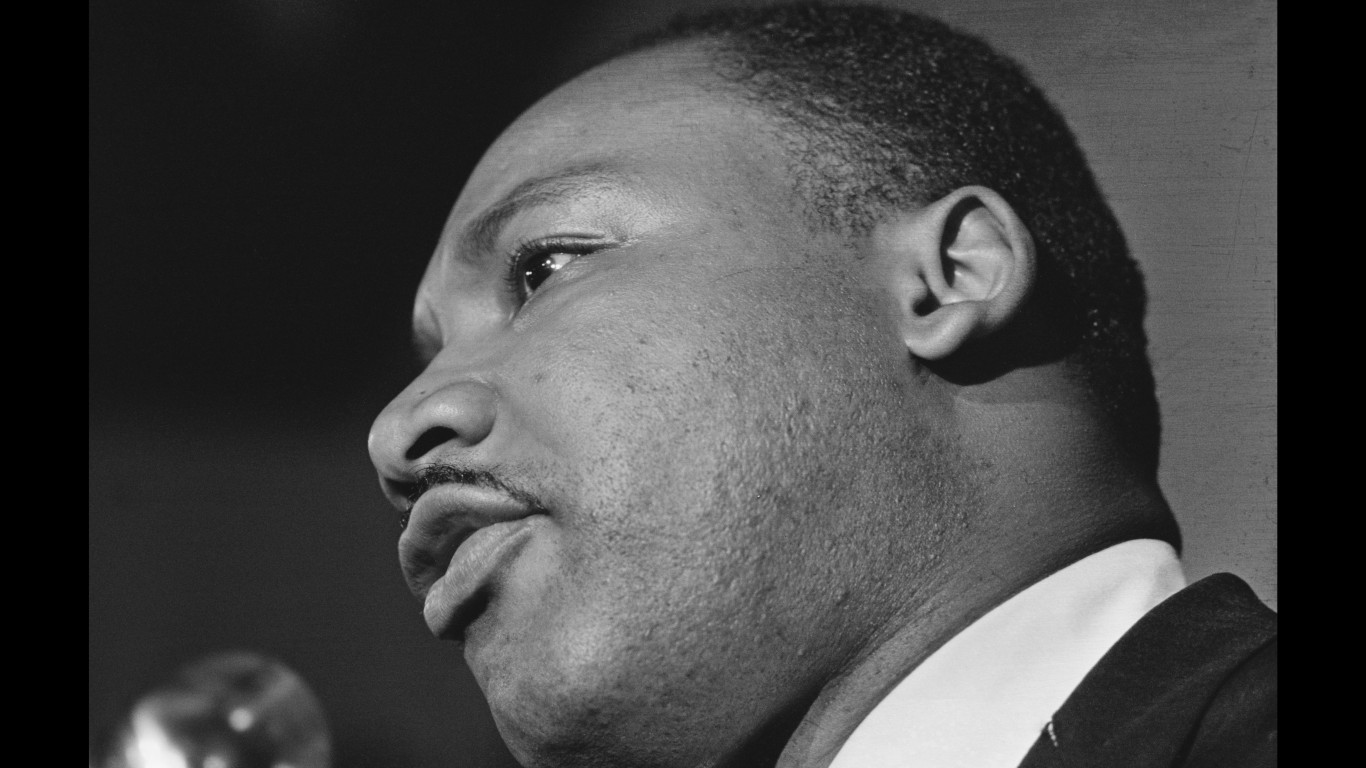
According to a new report, total global military expenditure rose to $1.8 trillion in 2018, a 2.6% increase from the previous year.
Military spending in China rose for the 24th year in a row. While overall military spending in the U.S. is down compared to a decade prior, due largely to the conclusion and de-escalation of two of the most expensive wars in its history, but military spending in the United States increased for the first time in seven years. These two countries account for such a substantial share of total global arms expenditure that their two increases in military spending alone largely explain the global increase.
The United States and China are by no means the only world powers that spend billions each year on the military. The top 14 military spenders, after the United States, can be found on five continents, and each has its own vast web of military and political alliances. Some are allies; others bitter enemies.
Many of these countries buy a large share of their weapons from the United States, the largest supplier of arms in the world.
Based on annual military spending estimates from the Stockholm International Peace Research Institute’s “Trends in Military Expenditure 2018” report, 24/7 Wall St. reviewed the 15 countries with the largest military expenditures in 2018.
Click here to see the countries spending the most on war
Click here to read our methodology
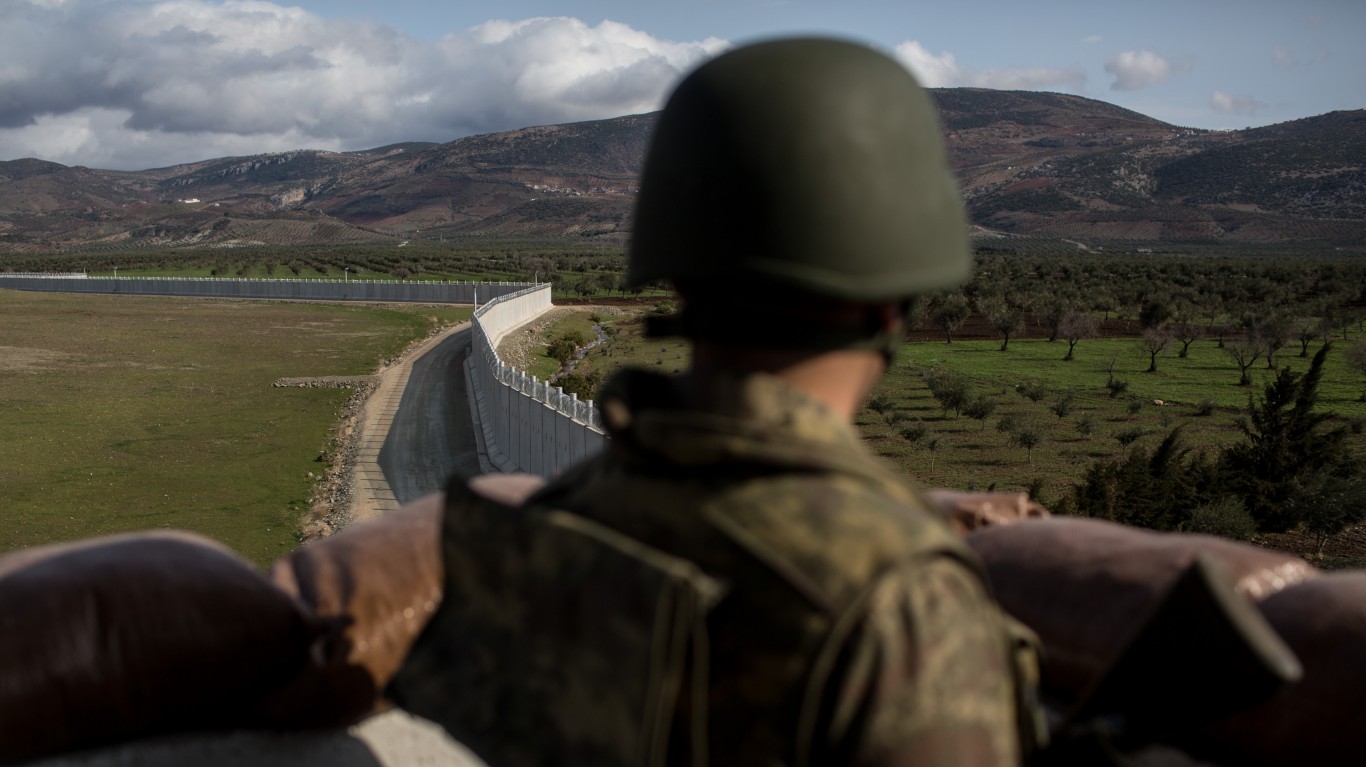
15. Turkey
> 2018 military spending: $19.0 billion
> Military spending change, 2009-2018: +65%
> Expenditure as pct. Of GDP: 2.5%
> Military spending per capita: $235
A NATO member since 1952, Turkey is one of the biggest military spenders in the world, spending $19 billion on its military in 2018. With over 500,000 armed personnel as of 2017, Turkey has the second largest standing military in NATO after the United States. Turkey’s military spending in 2018 represents a 65% increase over a 10-year period, one of the largest increases among the world’s top military spenders. NATO has suggested Turkey no longer be sold the F-35 Lightning as long as it continues to plan to purchase a Russian air-defense system because the system could help Russia learn more about the American-made jet’s vulnerabilities.
[in-text-ad]
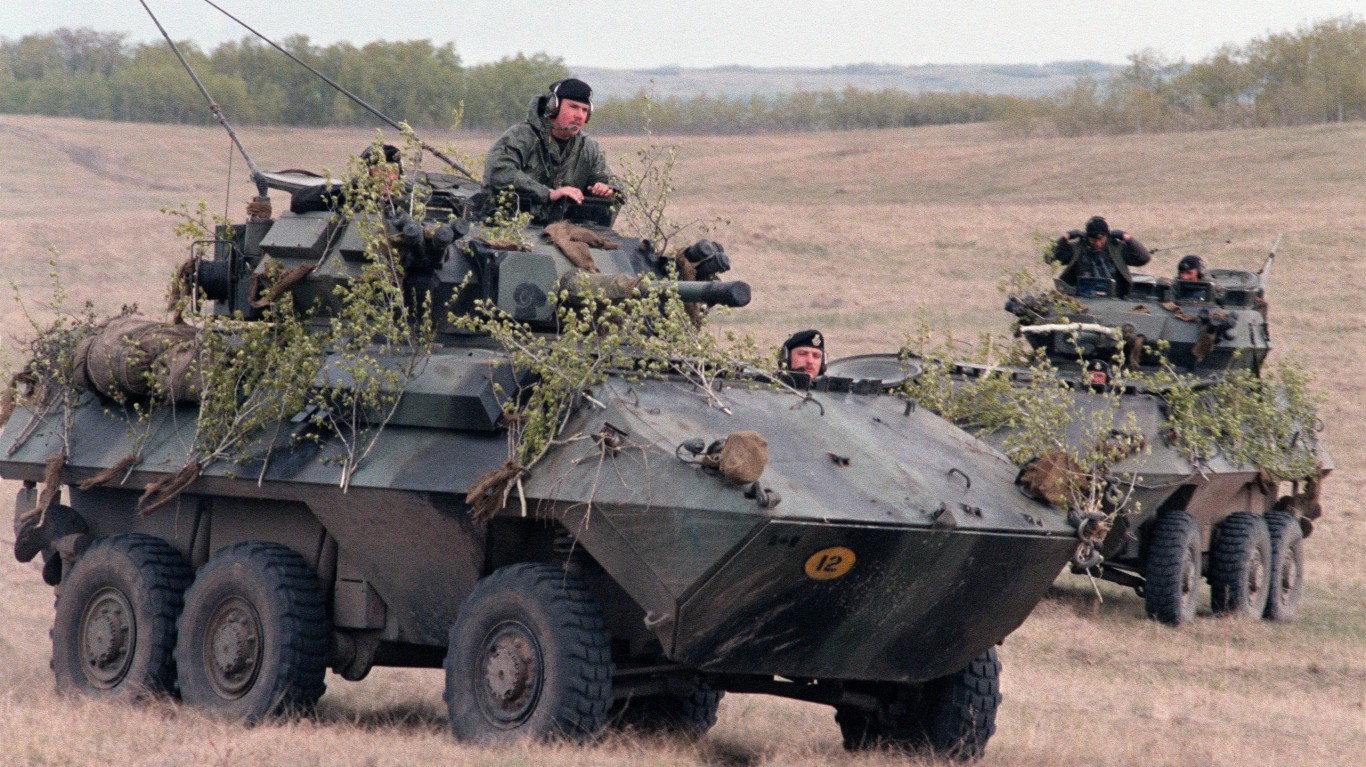
14. Canada
> 2018 military spending: $21.6 billion
> Military spending change, 2009-2018: +12%
> Expenditure as pct. Of GDP: 1.3%
> Military spending per capita: $588
Canada spent $21.6 billion on its military in 2018, the 14th most in the world. The country’s 2018 expenditure was slightly more than in 2017 and 12% more than a decade ago. Still, Canada’s military expenditure accounts for a relatively low percentage of the nation’s GDP at just 1.3%. This percentage is lower than the vast majority of the countries spending the most on the military. In the United States, for example, military spending accounts for 3.2% of GDP.

13. Australia
> 2018 military spending: $26.7 billion
> Military spending change, 2009-2018: +21%
> Expenditure as pct. Of GDP: 1.9%
> Military spending per capita: $1,085
Citing disputes in the South China Sea and a rise in terrorism in Europe, Australian leaders have opted to build up the nation’s military. Total military spending in Australia has increased 21% over the past decade. In 2018, Australia had one of the highest per-capita military expenditure among major military powers, at $1,085 per person. Of the 15 nations with the largest military budgets, only the United States and Saudi Arabia spend more on their armed forces per person than Australia.
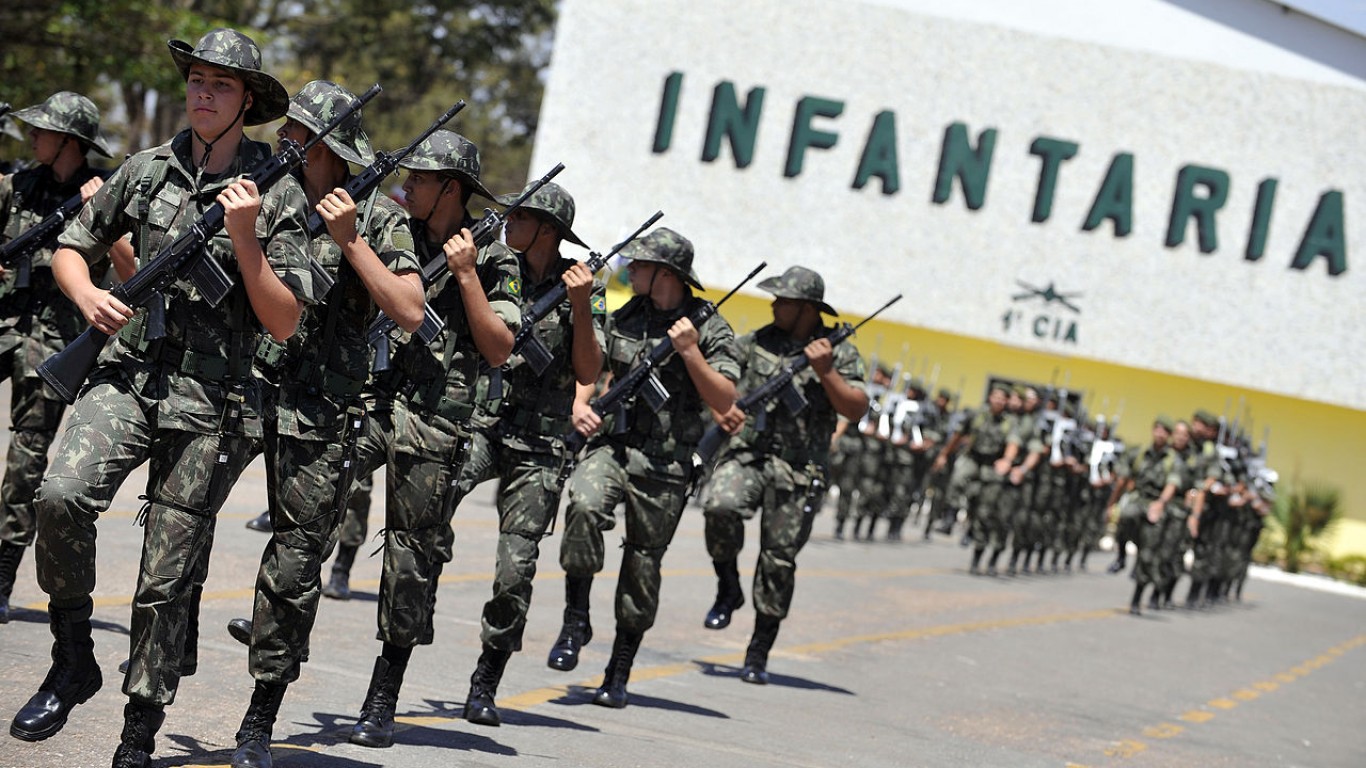
12. Brazil
> 2018 military spending: $27.8 billion
> Military spending change, 2009-2018: +17%
> Expenditure as pct. Of GDP: 1.5%
> Military spending per capita: $133
The most populous nation in South America is also the continent’s biggest military spender — the government of Brazil spent $27.8 billion last year on its armed forces, about 50% of total South American spending . The next largest military spender on the continent was Colombia, at $10.6 billion. While the country has experienced ongoing economic turmoil and national budget cuts, military spending is up by 17% over the past decade.
[in-text-ad-2]

11. Italy
> 2018 military spending: $27.8 billion
> Military spending change, 2009-2018: -14%
> Expenditure as pct. Of GDP: 1.3%
> Military spending per capita: $459
Unlike most countries on this list, Italy is cutting back on military spending. In the last decade, Italian military spending declined by 14% to $27.8 billion, including a $1.4 billion decrease between 2017 and 2018. Italy’s spending cut was fourth steepest 10-year drop among the 40 top military spenders worldwide. There is a chance the decline in military spending will be reversed, as Italy’s interior minister has suggested the possibility of introducing obligatory military service for the nation’s young citizens.

10. South Korea
> 2018 military spending: $43.1 billion
> Military spending change, 2009-2018: +28%
> Expenditure as pct. Of GDP: 2.6%
> Military spending per capita: $837
Still technically at war with its neighbor to the North, South Korea maintains a well-funded military in large part due to the ongoing tensions between the two nations.
South Korea requires men to serve in the armed forces for at least 21 months. The country spent $43.1 billion on its military in 2018, a 5.1% increase compared to 2017, the largest single-year increase there since 2005. North Korean military activity, such as nuclear and ballistic missile testing displays, has been on the rise in recent years following Kim Jong-un’s ascension to power. In April 2019, North Korea announced it had test-launched a currently unknown new weapon it described as a “tactical guided weapon.”
[in-text-ad]
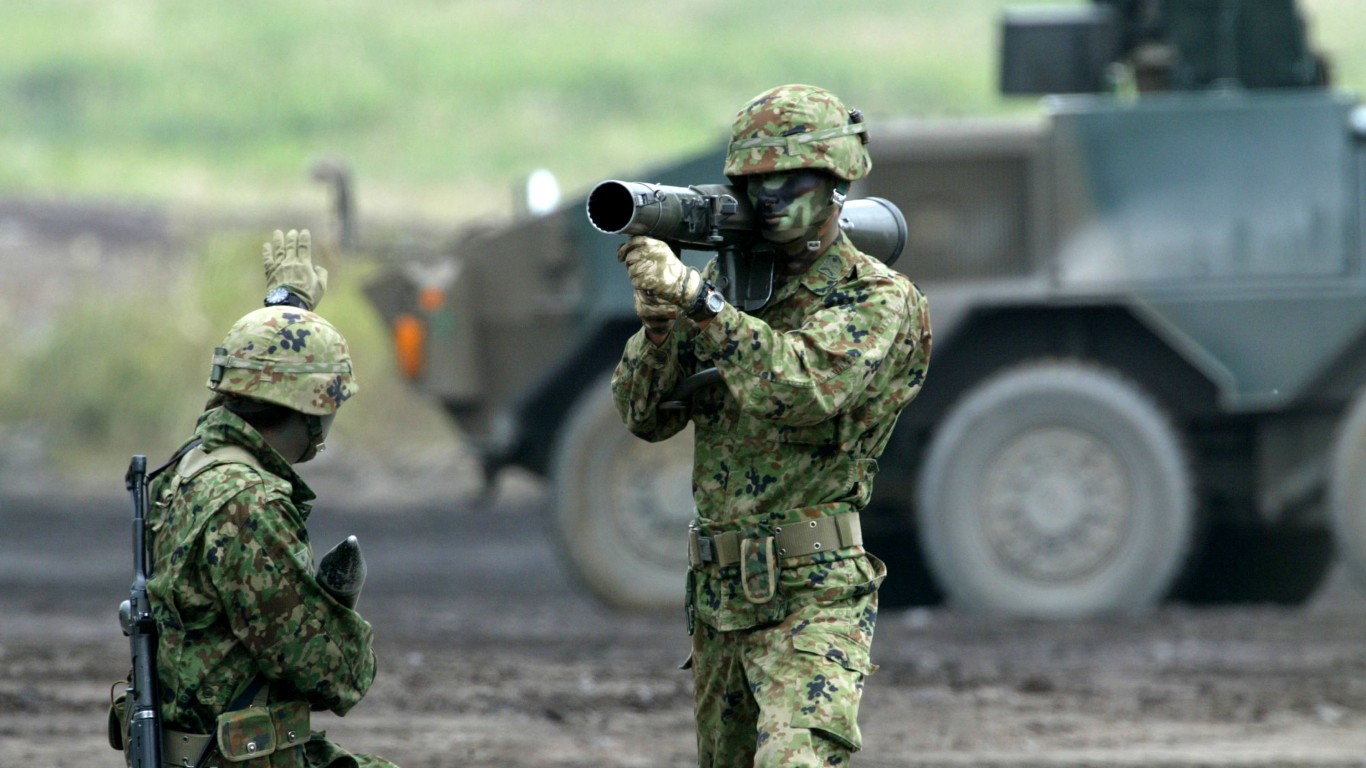
9. Japan
> 2018 military spending: $46.6 billion
> Military spending change, 2009-2018: +2%
> Expenditure as pct. Of GDP: 0.9%
> Military spending per capita: $368
Japan’s more than $46.6 billion military budget in 2018 accounted for less than 1% of its GDP that year. It is the only nation among the 25 largest military spenders that spends less than 1% of GDP on its military. Still, Japan is the third largest military spender in Asia, behind China and India. Japan is a close military ally of the United States and hosts several U.S. military bases. The U.S. base in Okinawa, however, is a source of contention between the two countries.
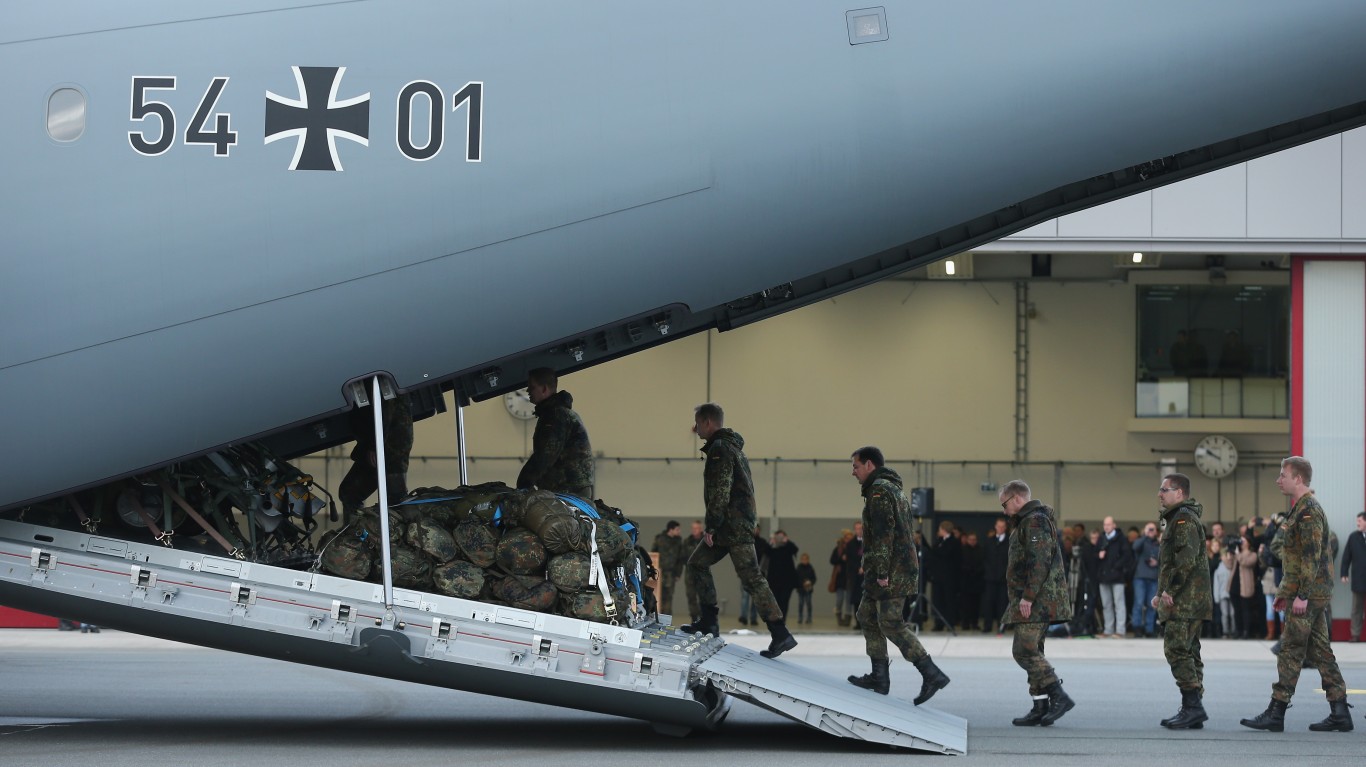
8. Germany
> 2018 military spending: $49.5 billion
> Military spending change, 2009-2018: +9%
> Expenditure as pct. Of GDP: 1.2%
> Military spending per capita: $599
Though Germany is Europe’s largest economy, it ranks behind countries like France and the U.K. in overall military spending. Germany spends 1.2% of its GDP on its armed forces, one of the lowest percentages among countries spending the most on their militaries. For context, France spends 2.3% of its GDP on the military, nearly double what Germany spends.
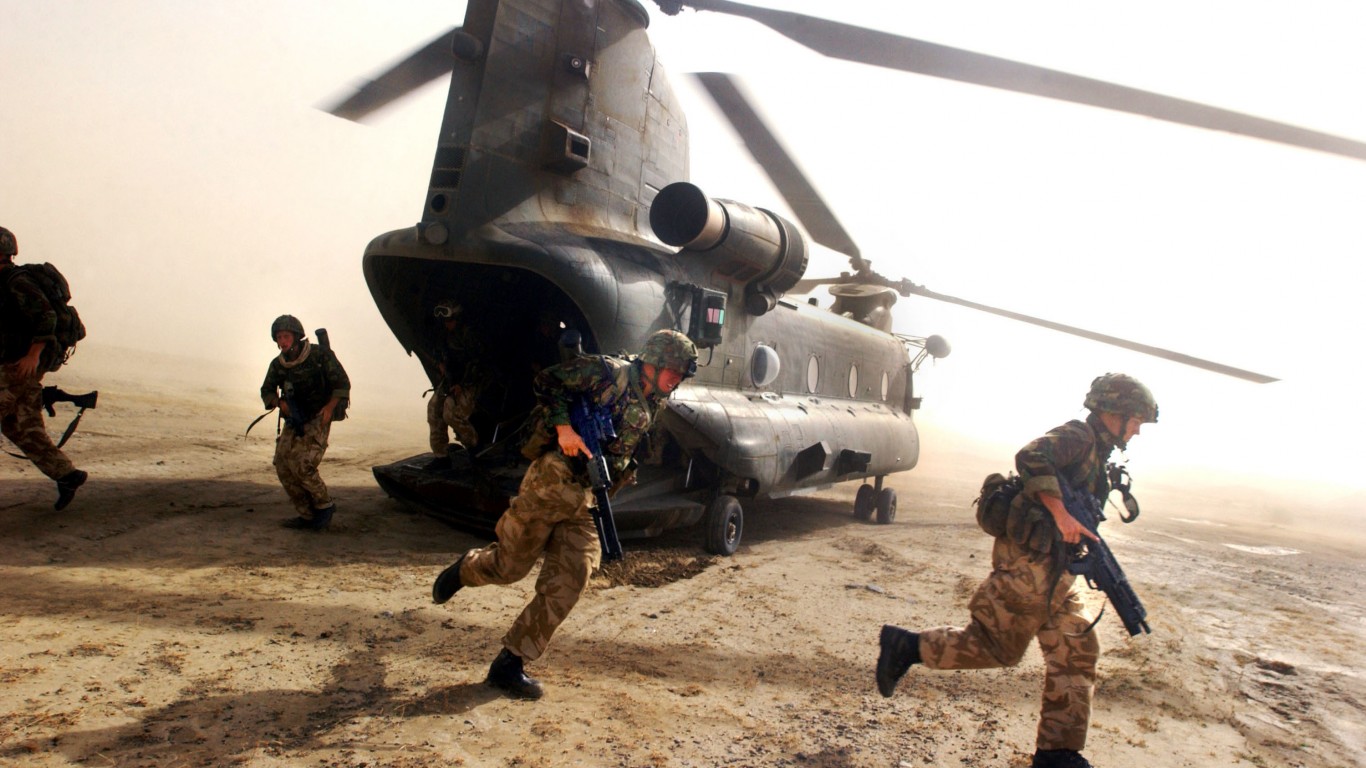
7. United Kingdom
> 2018 military spending: $50.0 billion
> Military spending change, 2009-2018: -17%
> Expenditure as pct. Of GDP: 1.8%
> Military spending per capita: $757
As a world leader and a key member of NATO, the U.K. military plays a crucial role in the transatlantic alliance. During the first stages of the U.S.-led wars in Iraq and Afghanistan, the U.K. was a major contributor of forces. In the past decade, as its involvement in those wars has ended, British military spending has declined by 17%. With $50 billion in total military spending in 2018, the U.K. still has the second largest military budget in Europe.
[in-text-ad-2]
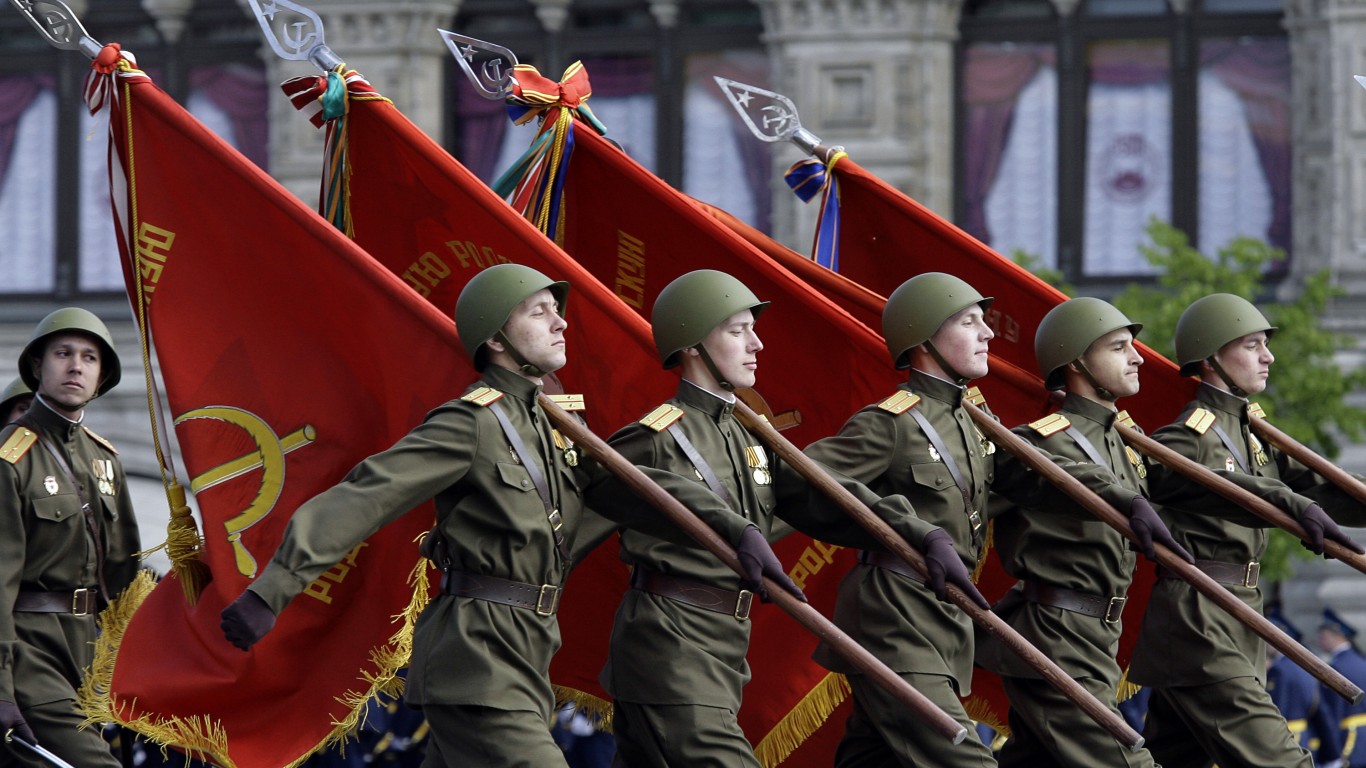
6. Russian Federation
> 2018 military spending: $61.4 billion
> Military spending change, 2009-2018: +27%
> Expenditure as pct. Of GDP: 3.9%
> Military spending per capita: $425
Russian President Vladimir Putin announced in 2011 a plan to spend over 20 trillion rubles — roughly $360 billion — to revamp Russia’s military. Over the past two years, however, Russian arms spending has dropped sharply largely because of economic difficulties in the country. Despite the decline, Russia’s military spending is still up by 27% compared to 2009. Russia was involved, either directly or indirectly, in several armed conflicts over the last few years, including in the Crimean Peninsula.
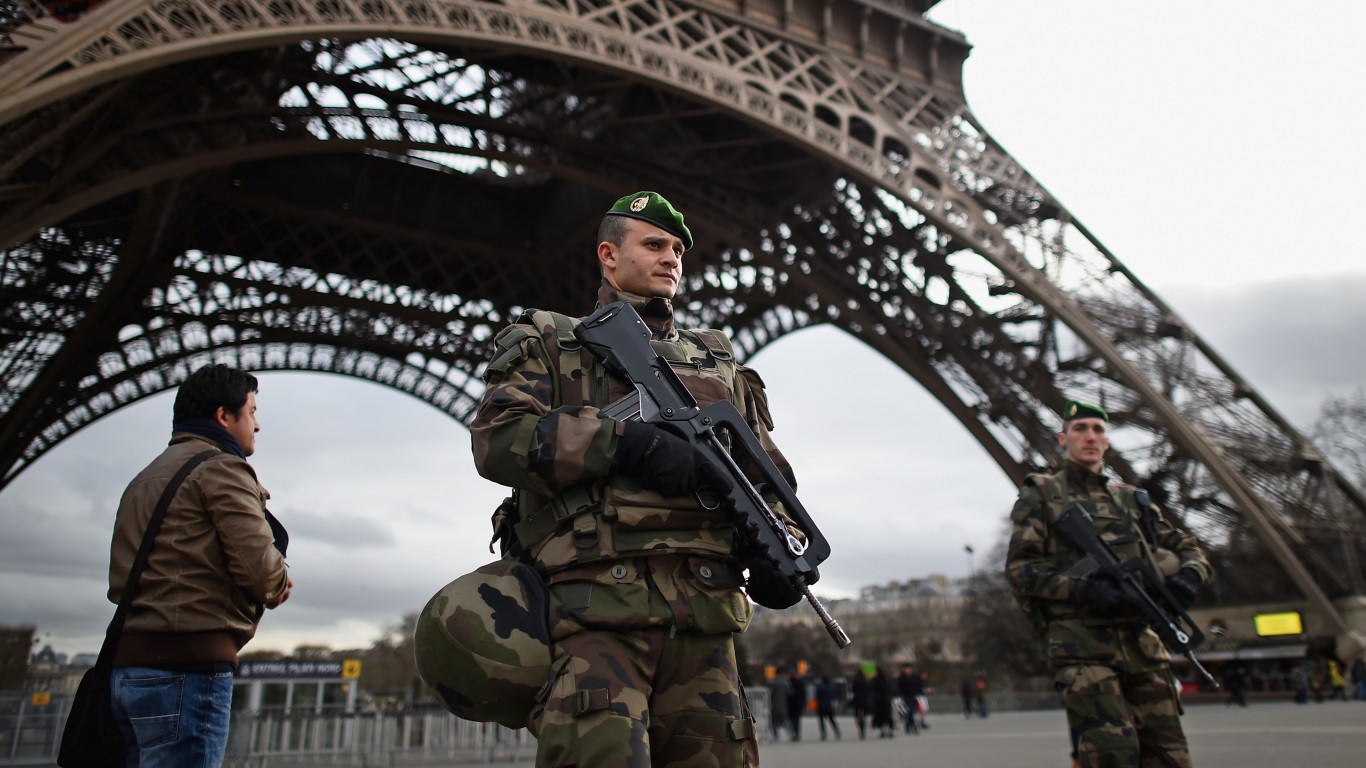
5. France
> 2018 military spending: $63.8 billion
> Military spending change, 2009-2018: +2%
> Expenditure as pct. Of GDP: 2.3%
> Military spending per capita: $951
France spent $63.8 billion on its military in 2018, $13.8 billion more than the United Kingdom, the next biggest spender in Europe. In part because of Russia’s substantial recent decline in spending, France is now one of the five largest military spenders in the world. In early 2019, the French minister of the armed forces reiterated the nation’s intention to become a world power in cyber warfare operations.
[in-text-ad]
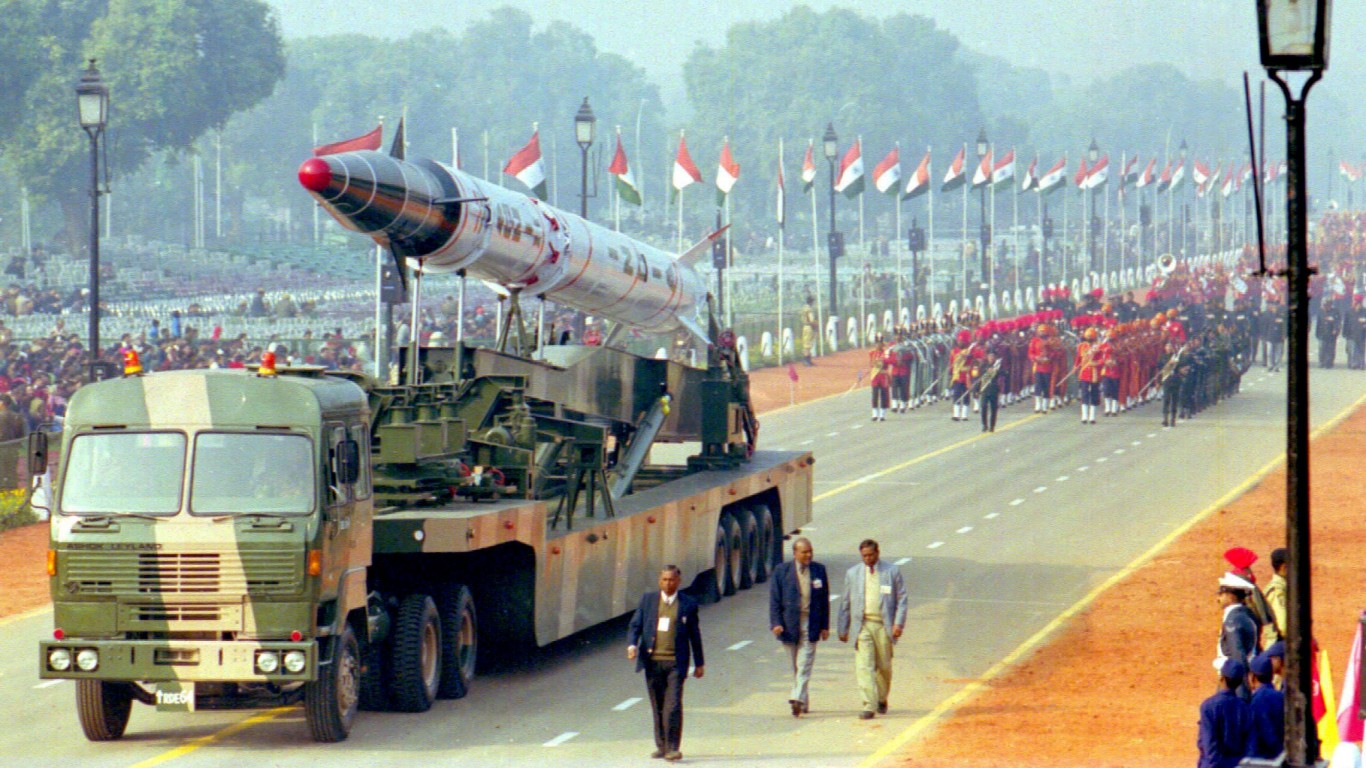
4. India
> 2018 military spending: $66.5 billion
> Military spending change, 2009-2018: +29%
> Expenditure as pct. Of GDP: 2.4%
> Military spending per capita: $50
Though India spends just $50 per person on its military, far less than any other country on this list, the nation of over 1.3 billion people is still among the top military spenders in the world. India has continued to build up its military amid a long-running dispute with neighbor Pakistan over the Kashmir region. Both countries may be ramping up their nuclear weapons, which could partially explain India’s above-average military expenditure as a percentage of its GDP.
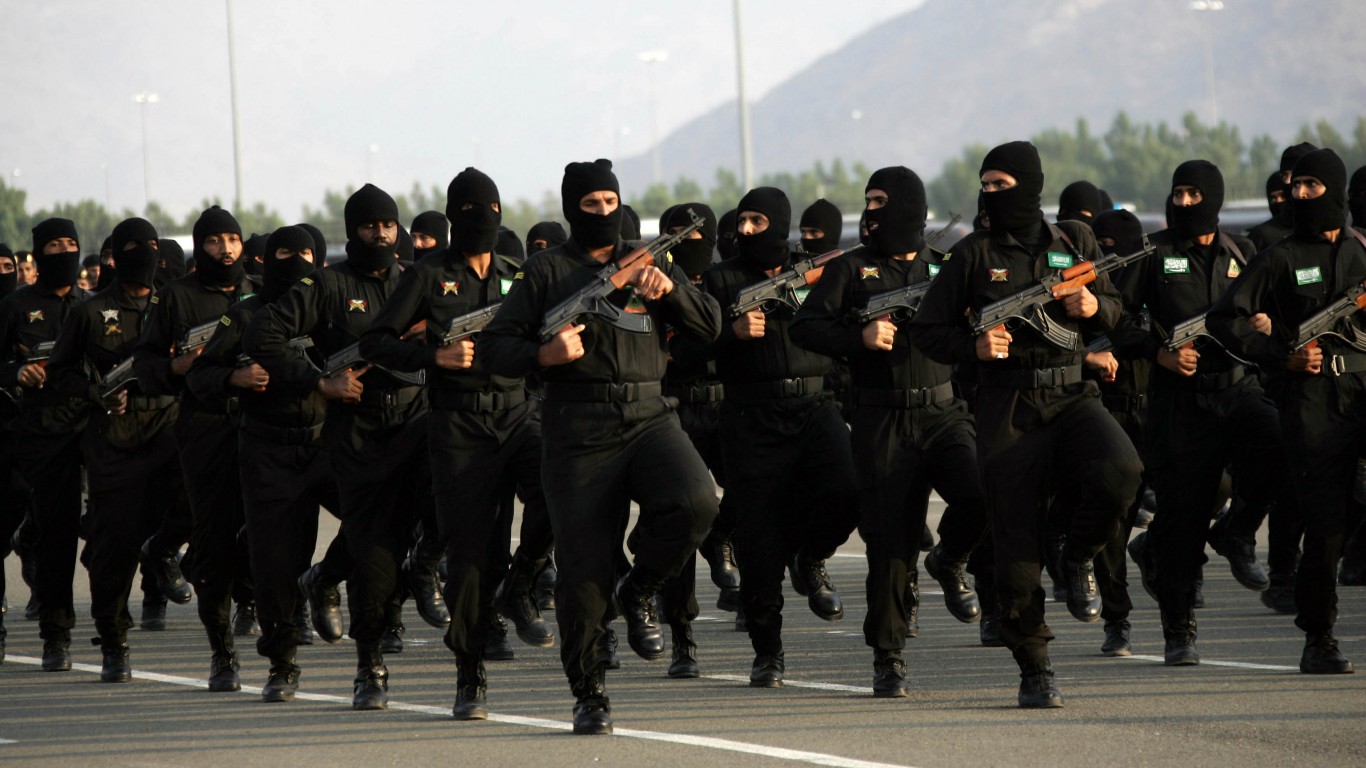
3. Saudi Arabia
> 2018 military spending: $67.6 billion
> Military spending change, 2009-2018: +28%
> Expenditure as pct. Of GDP: 8.8%
> Military spending per capita: $2,052
The Saudi government spent $67.8 billion on its military in 2018. The country secured an arms deal worth over $0.5 billion with the United States in March 2018. The United States will supply its Middle Eastern ally with nearly 6,700 missiles as well as maintenance equipment for American-made tanks and helicopters. Saudi Arabia spends 8.8% of its GDP on its military, by far the highest percentage of any country on this list and one of the highest in the world.
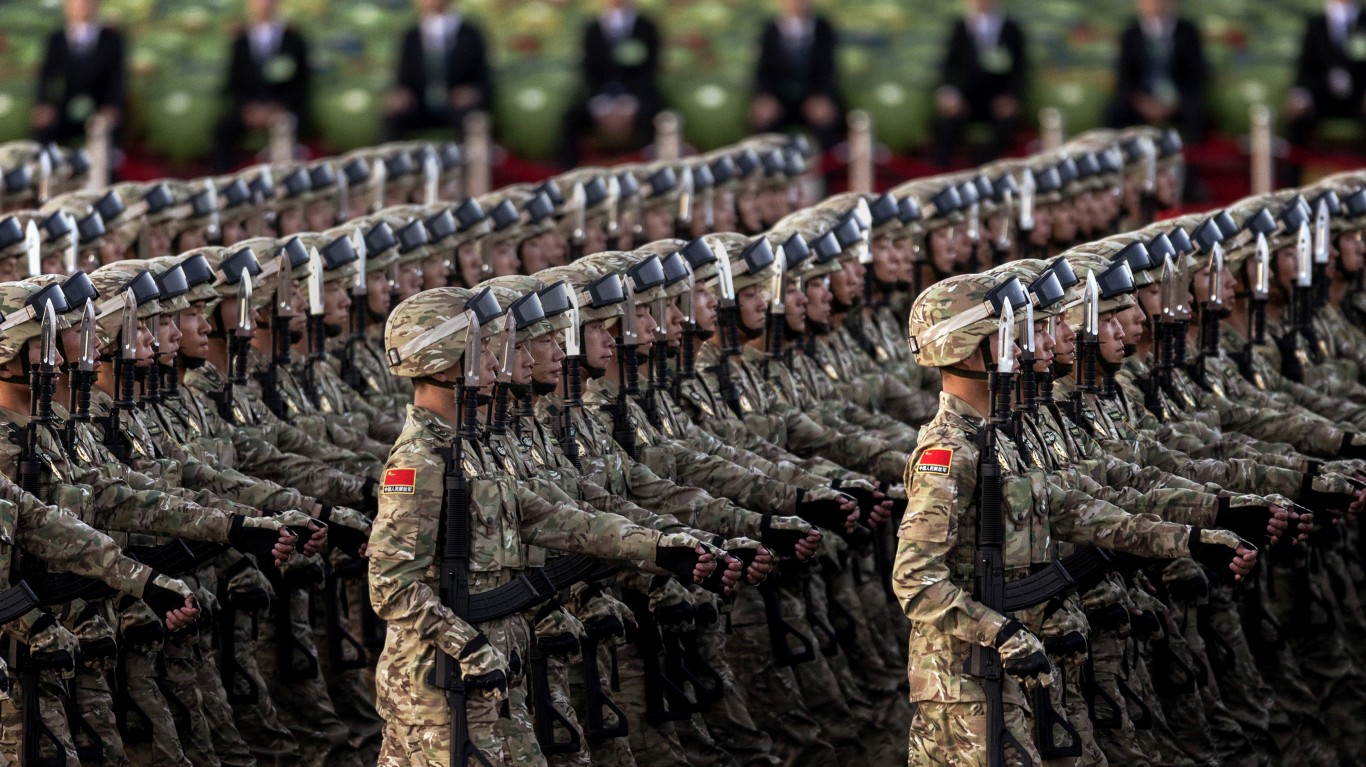
2. China
> 2018 military spending: $250.0 billion
> Military spending change, 2009-2018: +83%
> Expenditure as pct. Of GDP: 1.9%
> Military spending per capita: $180
No major military power has ramped up its military like China in the past decade. Since 2009, the nation’s military expenditure has increased by 83%, and this year represents the 24th straight year of growth in military spending. The world’s most populous nation requires males ages 18-22 years old to serve in the military for at least two years and has an armed forces size of 2.7 million personnel. China is also bulking up its navy — its second aircraft carrier is near completion.
[in-text-ad-2]
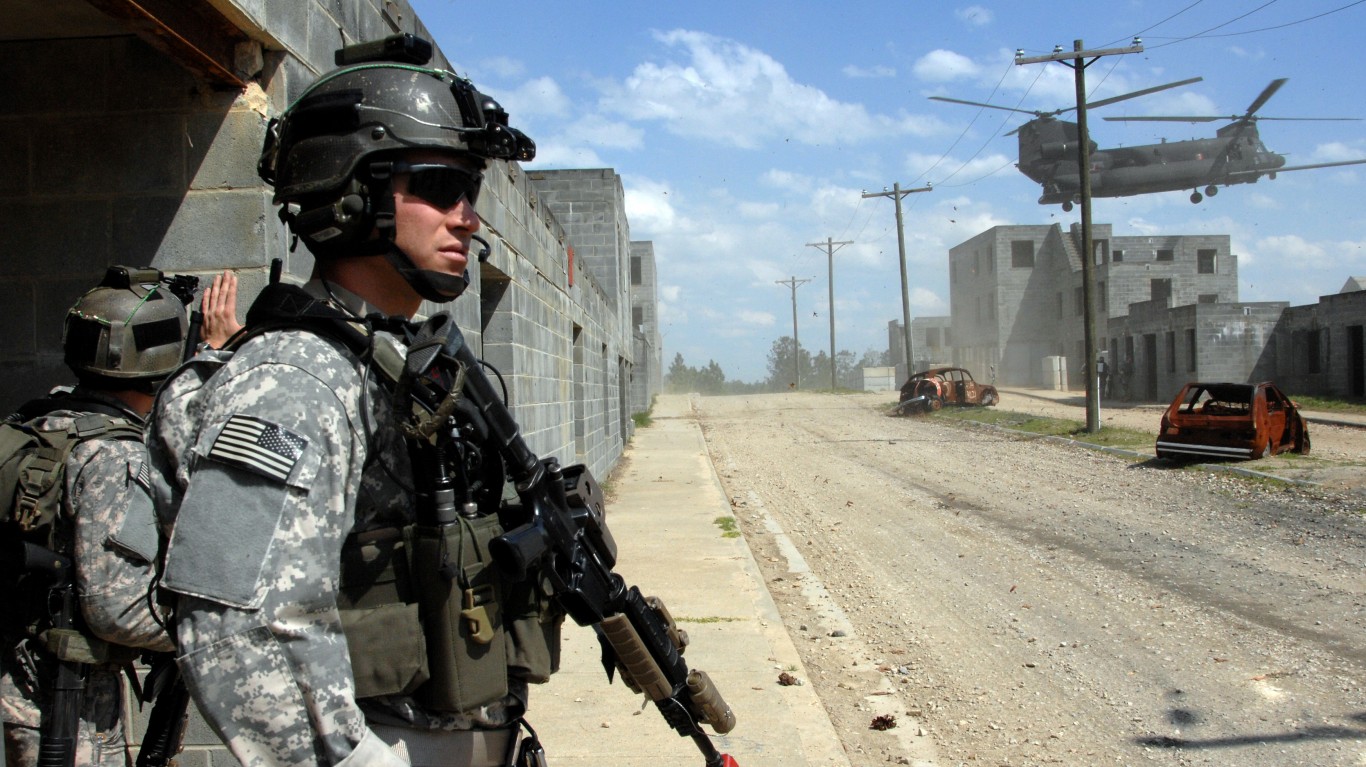
1. United States
> 2018 military spending: $649.0 billion
> Military spending change, 2009-2018: -17%
> Expenditure as pct. Of GDP: 3.2%
> Military spending per capita: $1,996
The United States has by far the best funded military in the world. The U.S. government spends more on its military than the next seven highest spending countries combined. More than one-third of the world’s entire military spending comes from the United States. The American military’s footprint can be found in hundreds of bases in dozens of countries around the world. Though it still spends far more than any other country, America’s $649 billion military expenditure in 2018 was 17% lower than it was 10 years ago. The decrease was likely in large part the result of the end of the Iraq War and the decline in spending on the war in Afghanistan.
Methodology
In order to determine the countries spending the most on war, 24/7 Wall St. reviewed estimated military spending from the Stockholm International Peace Research Institute, or SIPRI, in its “Trends in World Military Expenditure 2018” report. Spending as a share of GDP, per-capita expenditure, and absolute spending figures for 2018 and 2009 also came from SIPRI. Military expenditure includes current military forces and activities, including salaries and benefits, operational expenses, arms and equipment purchases, military construction, research and development, central administration, command, and support.
Find a Qualified Financial Advisor (Sponsor)
Finding a qualified financial advisor doesn’t have to be hard. SmartAsset’s free tool matches you with up to 3 fiduciary financial advisors in your area in 5 minutes. Each advisor has been vetted by SmartAsset and is held to a fiduciary standard to act in your best interests. If you’re ready to be matched with local advisors that can help you achieve your financial goals, get started now.
Thank you for reading! Have some feedback for us?
Contact the 24/7 Wall St. editorial team.
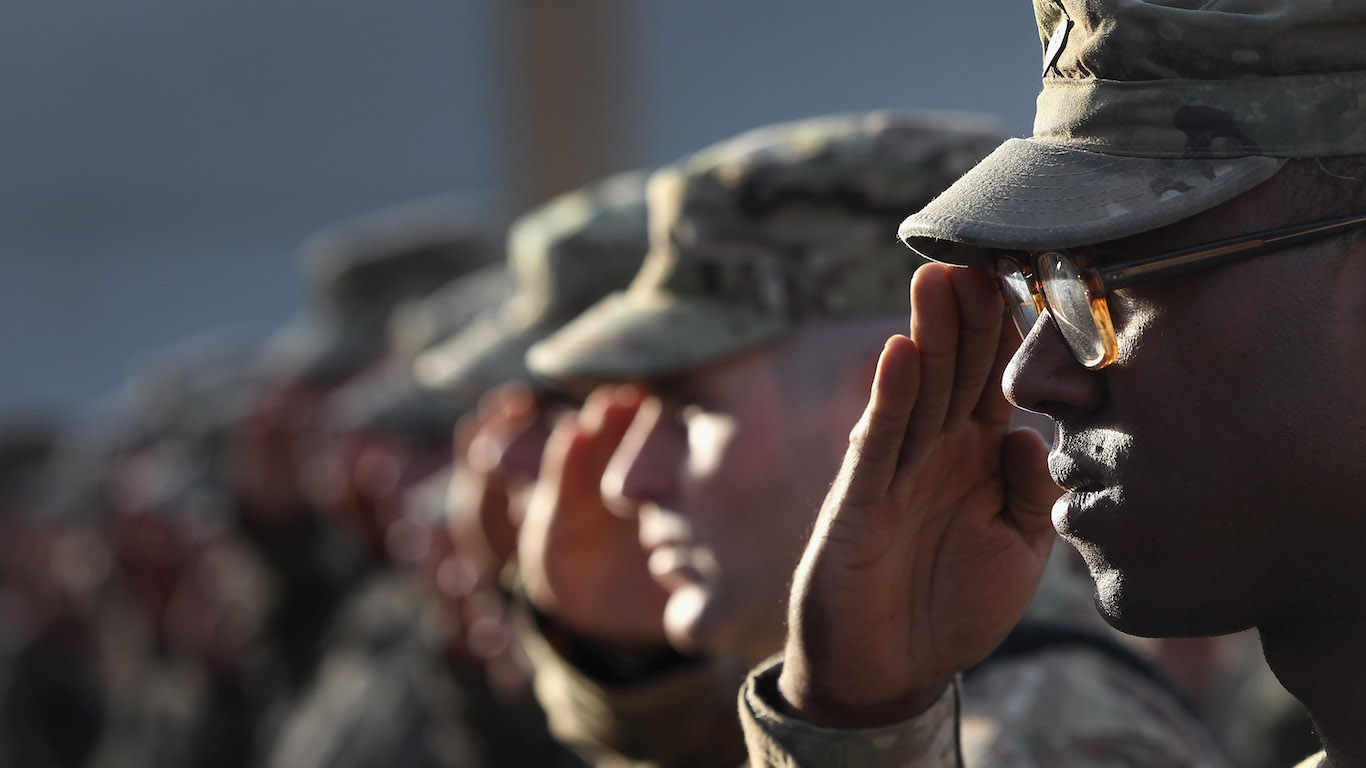 24/7 Wall St.
24/7 Wall St.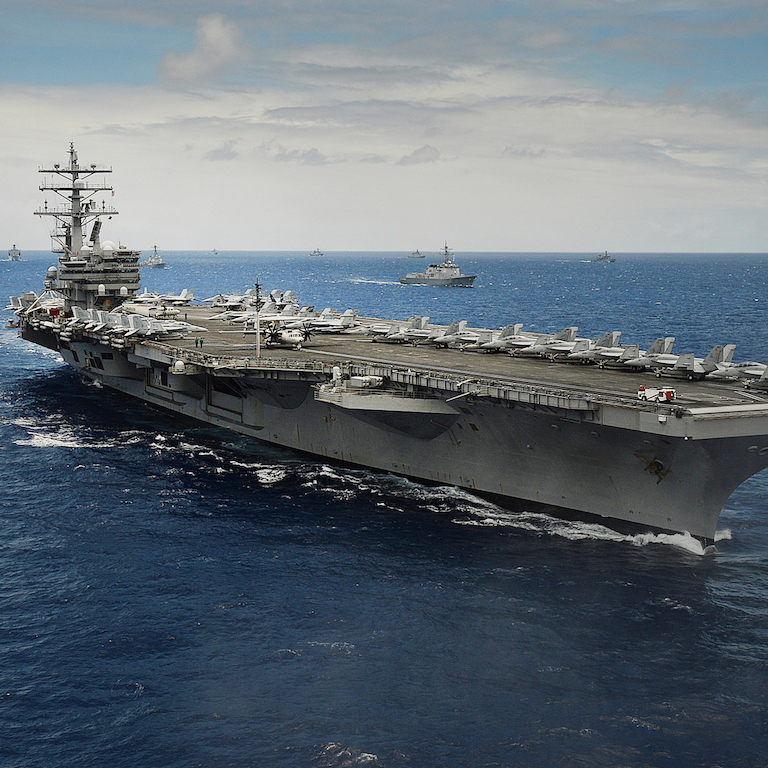 24/7 Wall St.
24/7 Wall St.

